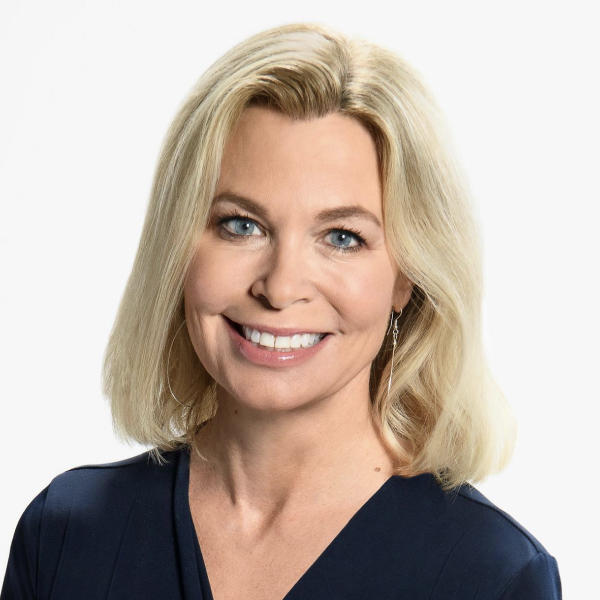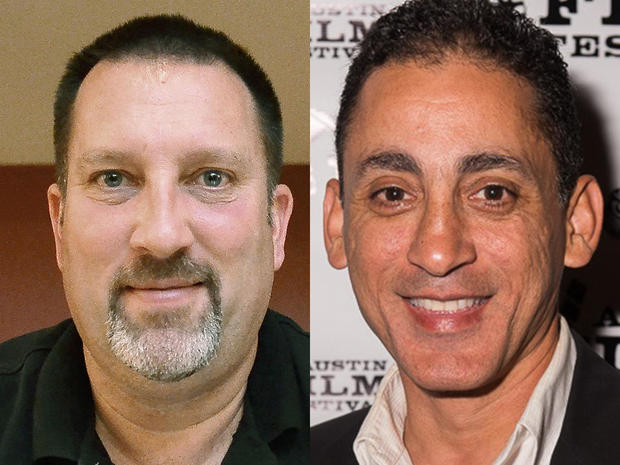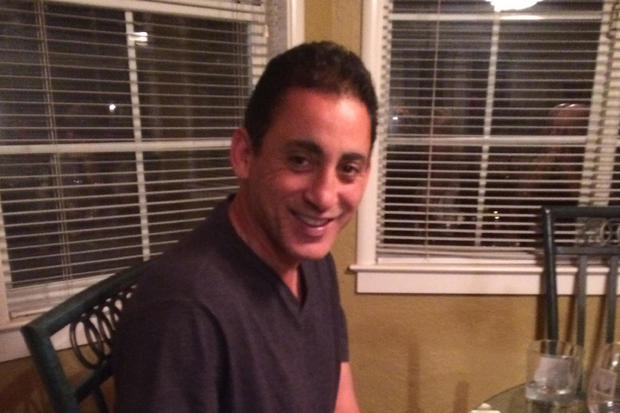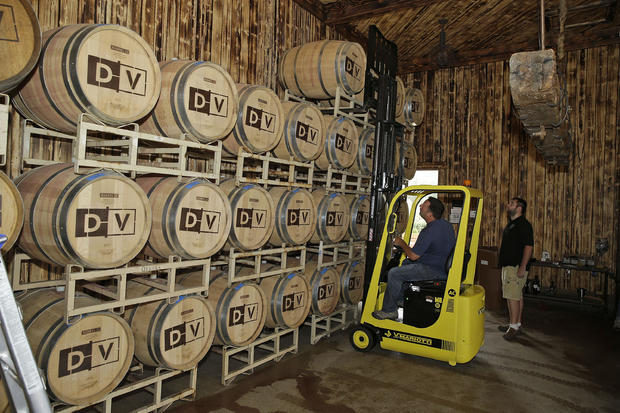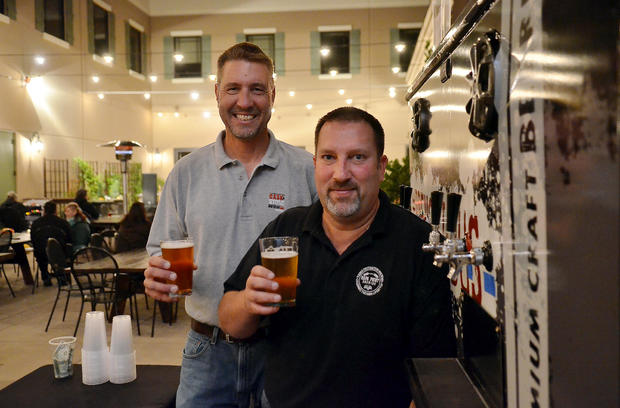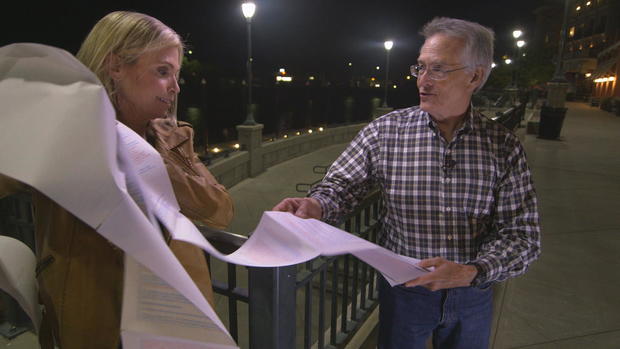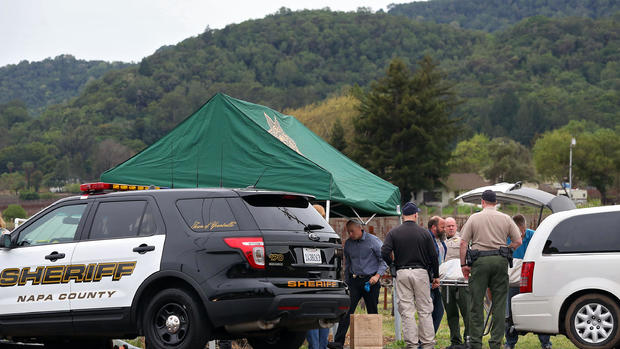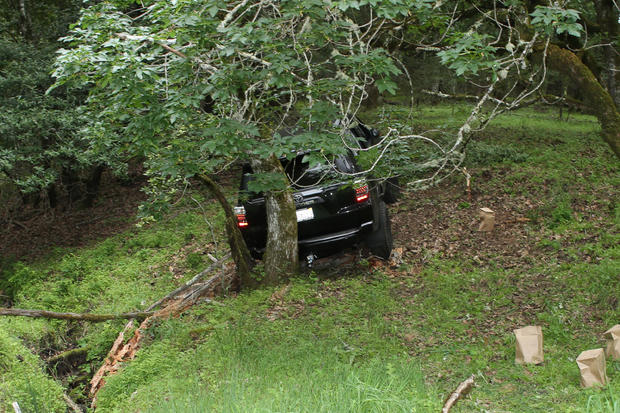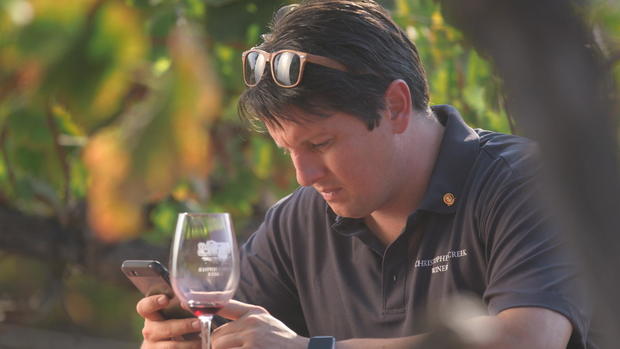Grapes of Wrath: A tale of money, wine and murder in Napa
[This story first aired on Jan. 6, 2018. It was updated on Aug. 18.]
It was a business deal right out of a Hollywood movie. An investor in a Napa Valley winery ponied up $800,000 cash in an effort to make a fortune in the wine business. What he didn't realize then was that he was investing in his own murder.
"He shot me! He's coming after me in his truck," investor Emad Tawfilis shouted to a 911 dispatcher as he triemod to outrun Robert Dahl through the California vineyard.
Correspondent all, Tracy Smith and "48 Hours" investigate the unlikely showdown between Tawfilis and Dahl that gripped the region three years ago.
It's a case that exposes the unusual relationship between Dahl, an entrepreneur drawn to the glamour of the Napa Valley wine scene, and Tawfilis, a wealthy Silicon Valley businessman willing to turn over his nest egg – in cash stuffed in a gym bag – to the entrepreneur with big plans.
"Money is intoxicating… and when you mix money and wine, I think you get intoxicated to the second or third power," says Lew Perdue, a tech entrepreneur and wine writer.
Dahl and Tawfilis both wanted to be in the lucrative wine business. That didn't work out as planned. The deal wasn't as it seemed and led to mistrust and a lawsuit. What followed was a story of ambition, greed and stunning deception that unraveled in the same fields both men thought would make them richer.
What went wrong between these two millionaires? What led to murder in the vineyard?
BIG DREAMS
Police dispatcher: We have a male saying, "Help me! Help me!" … be advised the subject's saying that he has been shot again twice now … there's other people on the scene…
It was a showdown between millionaires Robert Dahl and Emad Tawfilis
KPIX: Wild details of a shocking murder in the Napa Valley. …A bitter money dispute ends in an execution-style shooting. This all started at Dahl Vineyards on Solano Avenue...
They were a couple of ambitious wine lovers who wanted to be in the business and own their own vineyards. But it ended in murder.
So "48 Hours" came to Napa Valley to figure out what happened, and what we discovered is really interesting. It turns out that no less than four people thought that they could have ended up targets of the killer, too.
Dawn King | Private investigator: It could have been me running through that vineyard ducking bullets.
Lew Perdue | Wine writer: I was probably number one on his list to kill.
Francine Knittel | Friend of Robert Dahl: My first thought was, "That could have very easily been Greg."
Tracy Smith | CBS News correspondent: What do you think would have happened if you were there?
David Wiseblood | Attorney: I think he would have killed me.
How do you get from two ambitious guys trying to make it in the wine business to a murder mystery with four or five other potential victims?
"48 Hours" found someone who can help explain it all, because his family has worked in these valleys for generations. And he says he could have been a victim that day, too.
Tracy Smith: So it's customary if we visit to open a bottle of wine?
Dominic Foppoli | Winemaker [Opening a bottle of wine]: It's the only way you can visit … gotta have some wine … Cheers.
Dominic Foppoli is pretty close to royalty here in wine country.
Dominic Foppoli: My and my brother and two sisters -- we're the fourth generation to be involved … I mean our great grandfather started doing this with grapes and making some wine in the early 1900s.
Now he and his brother and sisters and friends run the Christopher Creek Winery.
Tracy Smith: Are there a lot of dreamers who come here?
Dominic Foppoli: Oh yeah, big time … tech tycoons, Wall Street guys, rock stars, movie people, and they all wanna come and have a slice of this.
Dominic Foppoli: And a lot of people see the glamorous side of it without seeing the hard work that goes into it … the blood, sweat and tears that it really takes to get to the point where we're at right now … of drinking a great bottle.
Tracy Smith: How tough is it to break in?
Dominic Foppoli: It's very, very tough unless you're coming with a lot of money.
And then there's the matter of trust. Doing business in the wine country is often very personal.
Dominic Foppoli: You know their word is their bond. You shake their hands, you look them in the eye and you're good.
Tracy Smith: You bond with a person, and then, maybe, go into business with them.
Dominic Foppoli: Absolutely. That's a huge, huge part of it, because you need to know that you can -- you can trust that person.
But, as we will find out, watch out if that bond is broken -- because the stakes are high.
Lew Perdue is a tech entrepreneur and wine writer.
Lew Perdue: The money … makes people crazy... Money is intoxicating … and when you mix money and wine, I think you get intoxicated to the second or third power…
Tracy Smith: How often does it happen that somebody comes in with a lot of money and not so much knowledge about wine, but just wants to be a part of this?
Lew Perdue: Oh, every day.
Back in 2011, a guy named Robert Dahl was about to get drunk on all that money. He decided to leave Minnesota, where he had a decidedly unglamorous mold removal business, and become a Napa Valley wine entrepreneur.
Myles Davis | Friend of Robert Dahl: He had a booming voice… he was always the loudest guy in the room … big presence.
Myles Davis is an electrician who worked for Dahl, almost from the beginning of his time in Napa.
Tracy Smith: You were friends with him initially when he was doing what business?
Myles Davis: Selling and buying grapes.
"Selling and buying grapes" -- that's one way of saying Dahl was in the lower end of the wine business. He wasn't making fine wines. He was bottling no-name wine, making what they call "shiners."
Myles Davis: A shiner is bottle that doesn't have a label. And then he'd sell you that … and you'd put your own label on it.
Tracy Smith: Was he a good salesman?
Myles Davis: Oh, great salesman. He could sell anyone stuff.
Tracy Smith: So the wine didn't really have to be that good. He could sell it?
Myles Davis: Well, it never really was that good.
Tracy Smith: He talked a good game?
Myles Davis: He talked a great game.
Tracy Smith: You knew enough to know that he didn't know a lot?
Myles Davis: He had a good line of BS -- which is fine and made him funnier.
Tracy Smith: it was part of his charm that he could BS?
Myles Davis: Yeah, yeah, I loved it about him.
Dahl had moved to wine country with his wife and three children.
Myles Davis: His family is amazing. They're just wonderful people… His wife's a very sweet, loving woman, the kids are amazing. In fact, they call me their godfather.
Within a of couple years his bottling business was a big success and Dahl liked to show it.
Myles Davis: He showed up at my office with $10,000 and said "Let's buy a Harley."
Tracy Smith: I'm sorry?
Myles Davis: …he showed up at my office …
Tracy Smith: With $10,000 in cash.
Myles Davis: …and said, "We're buying a Harley. You pay me back in the next few months or whenever."
Myles Davis: That's Robert. He was -- he was all about stuff like that.
Tracy Smith: Did he seem concerned about money?
Myles Davis: No, never.
So it was in 2011 that Robert Dahl took his next big step toward his dream of making it big in the wine business. He linked up with that prince of the wine country, Dominic Foppoli.
Dominic Foppoli: I had met some people from Asia who were getting into importing some California wine.
Foppoli was young. He didn't have his own personal vineyard yet and he needed more product.
Dominic Foppoli: I couldn't literally package wine fast enough because I didn't have my own facility. …And so I met Robert ... he was very new to this but he was willing to work really, really hard … and he had genuineness that he could project … that made you want to trust him, made you want to like him.
Over the next year, Foppoli and Dahl became close.
Dominic Foppoli: We'd go out to dinner and hang out, and … as a friend he was always there. I could text him at 11 o'clock at night and he'd get back to me.
Business was good, and one day Dahl made him a proposition: they buy their own vineyard.
Dominic Foppoli: He called me up and said, "Hey, there's this place up in your neck of the woods."
… and so I came over and I met him here and I looked at this view and the vineyards … and literally an hour after sitting down with him we drank a bottle of wine on this deck. I said, "I'm in. Let's do this."
Foppoli staked everything he had on this partnership -- even his house.
Dominic Foppoli: So I say, this is something I'm gonna do and I have to go all in and I need you to be all in too. And he said, "I got you."
Foppoli didn't think it would be a stretch for Robert Dahl.
Dominic Foppoli: I assumed that this would be a little side project for him. …I never had any reason to doubt that he was doing tremendously well.
Tracy Smith: Did you feel like he had your back?
Dominic Foppoli: Oh, completely. There was not -- I didn't doubt for a second.
But almost as soon as the vineyard deal with Foppoli was closed, Dahl was looking for the next big thing.
Sharing ownership in a vineyard wasn't good enough; he wanted to be the boss.
To do that, Dahl needed new partners. And then he found just the man he was looking for -- a man with connections to the bright lights of Hollywood with a gym bag full of money.
CASHING IN
Jonathan Kesselman: I directed a film called "Jimmy Vestvood: Amerikan Hero." It's a comedy starring a comic named Maz Jobrani. …very funny film.
Director and screenwriter Jonathan Kesselman was shooting the film's wedding scene, when one of the extras struck up a conversation.
Jonathan Kesselman: While we're sort of in-between setups we started talking … he said, "Hi, I'm Emad, I'm the investor in the film," and just a really nice guy, we chatted.
Emad Tawfilis was a young businessman from Silicon Valley.
Tracy Smith: What kind of actor was he?
Jonathan Kesselman [laughs]: He was a better humanitarian than an actor. He was a good extra, he was very good! He hit his marks.
Tawfilis was principal investor in the film. He put up about $200,000 and Kesselman became friendly with him.
Jonathan Kesselman: He was like a business person in tech, and I think he was excited to be not a corporate guy anymore. …he had made a lot of money and he was tired of it and sort of wanted to explore other things in his life … things that he had passion for.
One of those passions was film; the other was wine. Tawfilis invited his new film director friend and his wife to the fancy home he owned near the wine country.
Jonathan Kesselman: It was just, you know, "I love wine. You guys like wine? Let's go wine tasting."
Jonathan Kesselman: He actually gave us his bedroom … his bedroom was very flashy … like there was a television inside the mirror in the bathroom. …he was very excited about his bathroom.
But wine was more than a passion for Emad Tawfilis – it was a driving ambition. In 2011, Tawfilis got to know Robert Dahl and they talked about the dream they shared of making it big in the wine business.
But this story isn't just about wine; it's about cash -- close to $1 million in cash.
If you're wondering what that looks like, "48 Hours" got some Hollywood prop money which looks a lot and feels a lot like the real thing.
And this is how Robert Dahl did his next deal -- $800,000 in a gym bag.
The money came from that movie investor, Emad Tawfilis, in 2013. According to Tawfilis, Dahl told him that returns on his investment would be big and, if he invested cash, they'd get better deals.
Tawfilis was jumping into business with Dahl with both feet.
Tracy Smith: It seems like the perfect match -- Robert who supposedly knows about wine but doesn't have the money, and Emad who doesn't know a lot about wine but has the cash.
Lew Perdue: Exactly.
Remember, Dahl had already started a vineyard business with Dominic Foppoli, but that wasn't enough for him. Shortly after Dahl's partnership with Foppoli began, it ended. There had been problems.
Now, Dahl wanted his own thing. He wanted his name on the bottle. Tawfilis was going to make that happen. His investment, which now totaled $1.2 million, would help launch Dahl Vineyards. Tawfilis was finally a player and Dahl was center stage.
Myles Davis: He's a salesman. It's a show.
Tracy Smith: Did people seem like they were having a good time?
Myles Davis: Oh, yeah, always. He pours good wine and he pours it well.
Tracy Smith: Generously?
Myles Davis: Generously … and it was a nice product.
And the business prospered -- so much that Dahl was soon able to repay Tawfilis part of his investment.
Everything that Robert Dahl touched seemed to be turning out golden and it was happening so fast now. Armed with Emad Tawfilis' money, Dahl was on his way to being everything he wanted to be: the big man in Napa.
Tracy Smith: Did he exude confidence?
Francine Knittel: He exuded confidence. Oh, my gosh. Exuded confidence. Like, I'm telling you, like nobody I've ever met before in my life.
That same year, Dahl started up another brand new business with that Napa couple, Francine and Greg Knittel.
They'd been pursuing their passions in Napa for years.
Francine did her art and Greg's construction business built some of the area's nicest homes and tasting rooms. Life was good.
Tracy Smith: So Napa clearly inspires you?
Francine Knittel: Yes, definitely. …And every time we come home, we just say to each other, "Look at where we live. We're so blessed."
And there was no hesitation when that new guy Robert Dahl came into their lives.
Greg Knittel: He was a very outgoing, charismatic, hardworking guy
Francine Knittel: Very hardworking.
Tracy Smith: So it seemed like a good guy to partner with?
Greg Knittel: Absolutely.
Francine Knittel: Oh, yeah.
Dahl and the Knittels started a craft beer brewery -- a business that created fancy, handmade beers. Greg Knittel was a handy partner for Dahl; his construction company built the brewery.
Tracy Smith: What did he … promise you?
Greg Knittel: Well, that we were gonna have … a reputable business that we would be able to hand off to our kids.
Francine Knittel: One time, I don't know how I ended up on the back of Robert's motorcycle … and he pointed out this mansion that's right off the Silverado Trail. And he looked back at me. And he said, "You know what? Greg and I are gonna make so much money that he's gonna be able to buy a house like this for you someday.
The business was off to a good start. They added a brew pub.
Francine Knittel: [Our brewmaster] made the best beer ever. Our restaurant was booming. The brewery was boo -- I mean, like, within, like, three or four months, like, it was incredible. It was incredible.
Francine and Greg even became close friends with Dahl and his wife, Janelle.
Francine Knittel: We did everything together for a year. …It was going really well. Like really, really well.
Greg Knittel: …he liked to live well. You know, he couldn't live in a 3,000-square-foot house. It had to be a 5,000-square-foot house.
Tracy Smith: It was all about looks.
Greg Knittel: He didn't have to have one brand new motorcycle. He had to have two brand new motorcycles.
Greg Knittel: I'm sure you'll play that video of him after the Napa earthquake.
Dahl was interviewed after the 2014 earthquake in Napa:
Shepard Smith: …if an East Coaster is thinking about coming to Napa for harvest season to have some nice wine and have a few dinners, is it time to call that vacation off?
Robert Dahl: Absolutely not. Everything is back going in wine country … it's a great time to come to wine country, see some grapes being crushed, taste some fresh juice and really take in the wine lifestyle…
Listening to Dahl's TV interview, it almost sounds like he could be the mayor of Napa, but things aren't always exactly as they appear to be.
Remember Dominic Foppoli, Dahl's former partner? Foppoli had been running the winery and Dahl was running the books.
Dominic Foppoli: We were selling a bunch of wine, but there wasn't enough money to keep paying our bills, which I didn't understand, I didn't get.
Tracy Smith: Where's the money going?
Dominic Foppoli: Where's the money going?
"Where's the money going?" That was the question plenty more people in the wine country were about to start asking.
SOUR GRAPES
By 2014, the new Dahl Vineyards seemed to be taking off.
Robert Dahl and Emad Tawfilis, the two ambitious entrepreneurs, were living their dreams. Dahl, himself, running the show, and Tawfilis, silent partner, providing the money.
But what Tawfilis didn't know, was partnerships with Robert Dahl had a way of turning sour.
Remember Dahl's first vineyard -- the one he shared with Dominic Foppoli? One day Foppoli got a phone call from their lender.
Dominic Foppoli: "I'm starting foreclosure proceedings on you guys."
Tracy Smith: Foreclosure proceedings?
Dominic Foppoli: Foreclosure, yeah. 'Cause we had missed our first payment to him -- for the winery
… So I called Robert … and he said …"you shouldn't be worried about that. I've got all that covered."
And I said, "Are you kidding me?"
Foppoli went ballistic.
Dominic Foppoli: This was dream and we were successful in everything we were doing.
Foppoli's life savings and reputation were on the line. He had to get rid of Dahl.
Dominic Foppoli: So my family and my partners -- my brother and my best friends -- came around and said, "We'll do whatever we need to do and let's get this guy out."
Foppoli got control of the vineyard, but he had to pay Dahl to go away. He was bitter.
Dominic Foppoli: You know, I introduced him as my partner and my friend. So I brought him into that circle of trust that we have here. …Everybody had welcomed him with opened arms because I vouched for him.
Dominic Foppoli: I had never been burned before. I was -- I was naïve.
And it turns out, Foppoli wasn't the only one.
Steve Burch | Winemaker: No one that ever put money into something that he was doing was ever gonna get anything back.
Steve Burch knows. He's a winemaker who worked for Dahl back when Dahl looked like he was the golden boy of wine country. Burch introduced him to celebrities.
For the comic and TV personality Adam Corolla, he bottled a sangria called "Mangria."
Steve Burch: We made money on it … but I know that there was a significant amount of payment for that that Adam never received.
And there was the rapper, E-40. He had Dahl package some wines for his label, Earl Stevens Wines.
Steve Burch: …we started his product and it went really well, but I know he wasn't -- he wasn't paid either.
And there was Burch himself.
Steve Burch: I left with him owing me a lot of money
Tracy Smith: Can you give me a ballpark?
Steve Burch: We'll say it was -- well over $10,000 [laughs].
The same thing happened to Dahl's friend, electrician Myles Davis. Dahl owed him $15,000.
Tracy Smith: Did you ever see that money?
Myles Davis: No.
Tracy Smith: But you were friends with him again?
Myles Davis: Yeah, 'cause he's a [laughs] -- he -- yeah, I'm fine with that. I mean, it wasn't about the money, it was about, you know … there was concerns that he was in trouble. So I -- I didn't feel like my little $15,000 was anything to worry about.
Tracy Smith: 'Cause he was getting underwater?
Myles Davis: Yeah.
Tracy Smith: Did you say anything?
Myles Davis: No.
Tracy Smith: No? Did you figure he'd find a way out of it?
Myles Davis: Yeah. I hoped he would.
And then there was Francine and Greg Knittel. Just a few months after the successful debut of the brewery they started with Dahl and a well-known brewmaster, the business started slipping.
Lew Perdue: I got the first inkling that Dahl wasn't what he says he was because a friend of mine went to his "brewery," and I put quotes around that because my friend liked craft beer, and he wasn't making beer at his quote, unquote "brew pub."
Apparently by the time Lew Perdue's friend stopped by for a drink, the brewery was no longer making its own beer.
Tracy Smith: He wasn't making beer at the brewery?
Lew Perdue: No … He was buying kegs from someone else. And when this friend of mine came face-to-face and told him about that, he just went ballistic.
Tracy Smith: Like he'd been found out.
Lew Perdue: Like he had been found out.
Dahl's partners, Francine and Greg Knittel, say they didn't know what Dahl was up to at the brewery and they were shocked when Dahl came in one day and announced he was shutting down the whole thing.
Greg Knittel: Robert's sitting there and he goes, "Guys, the brewery's not making enough money … I'm gonna close the doors."
The Knittels say they not only lost $250,000 of their own money; they had encouraged friends to invest too. And, unlike Myles Davis, they felt personally betrayed by their friend Robert Dahl.
Tracy Smith: what gets to you the most?
Francine Knittel: Somebody that we trusted … had this capability … were gonna pretty much screw us over.
But no one felt more ripped off than Emad Tawfilis. He thought he'd invested more than $1 million in a vineyard. Instead, Dahl diverted the cash, spending it on his lavish lifestyle, the brewery business -- just about anything else.
Dahl had stopped paying back the money he borrowed.
Tawfilis hired a lawyer. He was angry, he wanted his money, and he wanted to find out everything he could about Robert Dahl
Tracy Smith: …you amassed a pile of information about Robert Dahl.
Dawn King [reading from papers]: This is the pile of liens that Robert had against him. Civil judgment from Ford Motor Company, $19,000. Allied Building products company, $61,000, $53,000, $7.900.
Tracy Smith: Oh, my goodness.
Emad Tawfilis hired Dawn King, who has her own special niche in Napa Valley.
Dawn King: Well I'm a private investigator here in Napa … and I was an FBI agent for 10 years.
Tracy Smith: An FBI agent?
Dawn King: Yes.
Tracy Smith: So you can smell a rat?
Dawn King: Well, I like to put rats in prison anyway.
King started digging.
Dawn King: So he was not paying his bills. I mean, he was just like charging credit cards. …here's the Federal Credit Union, $53,000… And then you get into his lawsuits.
A lot of what King discovered happened back in Minnesota during the years before Dahl came to Napa. But to the private investigator, it told a story.
Dawn King: You know this is the theft -- one of his theft charges.
Tracy Smith: One of his theft charges?
Dawn King: Yes, he had two.
Dawn King: This was the theft by swindle.
Tracy Smith: He actually was convicted of theft by swindle?
Dawn King: He was.
Thefts and swindles got Dahl thrown into jail not once, but twice back in Minnesota, and left him a convicted felon.
Dawn King: I mean, this guy was a criminal.
Now, here in the wine country, Dahl seemed to be scamming again. Every time he'd get a business investment, the money seemed to go right into his pocket.
Tracy Smith: Was this kind of a Ponzi scheme?
Steve Burch: Yeah, to some extent, except that no one got paid. So usually in a Ponzi scheme, the first people in get paid.
Tracy Smith: But at this point, well, Robert did.
Steve Burch: It was -- right. Robert got paid, but Robert spent all the money.
In 2014, wine reporter Lew Perdue began to uncover the swindles Robert Dahl was pulling in Napa Valley. He started blogging what he found and guess who responded? Robert Dahl.
Lew Perdue [unfurling a seemingly never-ending document]: And those are his comments. Those are his comments and then he starts to rant paragraph by paragraph by paragraph.
Tracy Smith: Oh I see this, the caps in red.
Lew Perdue: Everything in … big red capital letters just keeps coming.
Tracy Smith: Oh, my goodness. This is like one of those magic scarves.
Lew Perdue: And it comes and it comes and it comes. Just ranting and ranting and ranting. I think I measured this at 26 feet.
Tracy Smith: And what did this say to you?
Lew Perdue: This says to me the guy's -- was off his nut.
Things were really heating up. Both sides were suing and it looked as if things were headed for a showdown.
REACHING A DEAL?
Emad Tawfilis was angry -- very angry. He wanted his whole investment back, but it wasn't looking good.
Dawn King: Oh, my gosh. I mean. I used to get 10, 15, 20 phone calls a day.
Tracy Smith: How desperate was Emad?
Dawn King: He was a desperate man. On a scale from one to 10, he was about a nine.
David Wiseblood | Emad Tawfilis' attorney: He was not gonna let someone like Robert Dahl take advantage of him and bully him into being submissive.
David Wiseblood: Emad came to me saying "I have this problem." So I looked at it and said, "Yeah, you have a problem." …So we devised a strategy.
That strategy was to hammer Robert Dahl in court and force him to pay up.
David Wiseblood: So the strategy was -- file a lawsuit in Napa … to basically get control of the collateral … and to basically prevent stuff from disappearing…
That collateral was mostly the wine tanks and all the equipment used to make the wine.
Tracy Smith: So what happened?
David Wiseblood: Robert didn't roll that --well … I had in a four-month period -- 19 court appearances in the Napa court, which is crazy… So, I mean, the short answer is that the Napa court issued an injunction against Robert … saying "you can't sell inventory," which in effect should have shut down his wine making and wine selling operations.
Tracy Smith: That all belongs to Emad, basically?
David Wiseblood: Right. Pretty much.
Even though Emad Tawfilis was winning in court, Robert Dahl was doing everything he could to cheat. He was even secretly taking equipment and trying to sell it off.
Steve Burch: Robert at that point had started hiding equipment, hiding whatever he could. He started moving stuff.
Robert Dahl's attorneys, Jasmine Duel and Kousha Berokim, say Dahl was a clever businessman, but he was no crook.
Jasmine Duel: There's a lot more than the headlines…
Tracy Smith: You think Robert's mindset was "I'm gonna take this…but I'll be able to pay it back and everything's gonna be OK?"
Jasmine Duel: Absolutely. I think he had every intention to pay back the entire loan.
Dahl's lawyers believed he was a stand-up guy. That classic all-American, risk-taking entrepreneur who puts it all on the line and at the last minute comes out a hero.
Kousha Berokim: The business was growing and it was not a Ponzi scheme or a house of cards.
Tracy Smith: I was shown a document that says Robert Dahl was convicted of swindle in Minnesota.
Kousha Berokim: If you look at that document again, you will see that that goes back to when he was about 19 or 21 years old or so.
Tracy Smith: But still, people look at that and say "once a conman, always a conman"
Kousha Berokim: …Robert definitely had his share of failed ventures before as well.
Tracy Smith: But you don't think that proves that he's a thief?
Kousha Berokim: Not at all. …a thief takes money and runs with it. A thief doesn't go to court.
Kousha Berokim: He was a risk-taker… And when you take risks sometimes you end up harming other people as well. But our system is set up for that.
In the wine business, Dahl's lawyers say, sometimes you win, sometimes you lose. And they insist Emad Tawfilis was the real villain in this business deal.
Tracy Smith: You think that was a scam for Emad?
Kousha Berokim: Absolutely. How would one come up with that much cash and why?
It's still a mystery where all that cash came from, but Robert Dahl's lawyers say Emad Tawfilis was so angry, he was determined to destroy Dahl's business.
Jasmine Duel: His barrels of wine were taken. His cars were taken. His brewing systems were taken. … He was in an impossible place.
With no business to operate, Dahl couldn't earn any money to pay off the debts he owed to Tawfilis and others.
And then, surprisingly, there was a breakthrough. It looked as if Tawfilis might get more of his money back.
The lawyers had come to a deal. Tawfilis and Dahl were going to get together to hammer out details. Dahl wanted to meet at his vineyard.
David Wiseblood: I went to my office Monday morning and I get a phone call from Emad: "David, I've decided to go to the winery."
Kousha Berokim: On that morning … I was on the phone and Emad's attorney was on the phone.
Tawfilis and Dahl were there in person; their attorneys joined them on a conference call.
David Wiseblood: There was a definite agreement on what was gonna be paid to Emad… It was just so eerily calm.
Tracy Smith: It was eerily calm?
David Wiseblood: It was eerily calm.
But then, Robert Dahl rocked the boat.
David Wiseblood: And he said, "I don't give an S what the lawyers negotiated" … "this is my offer," which was several hundred thousand dollars less than what was agreed to.
What seemed to be a nearly done deal suddenly started unraveling.
The lawyers felt it was a breakdown that Tawfilis and Dahl should deal with themselves.
Kousha Berokim: They were both business savvy and … this was something that they both could've easily handled.
So both lawyers got off the phone, and both expected to hear right back from their clients.
David Wiseblood: Twenty minutes go by. And I don't hear from Emad.
Jasmine Duel: We had no idea what was going on.
Kousha Berokim: I was expecting a call.
David Wiseblood: Then I got an email … saying there was a shooting.
Kousha Berokim: I got a call from Mr. Wiseblood … he said, "Kousha, tell me this didn't really happen."
Tracy Smith: You thought Emad lost it?
Kousha Berokim: I thought Emad lost it.
Jasmine Duel: We both thought that.
A DEADLY CHASE
On March 16 2015, Emad Tawfilis and Robert Dahl had finally gotten together to try and settle their ugly dispute. They'd been meeting one-on-one in a room inside a barn at Dahl Vineyards. Their lawyers joined on a conference call.
But just a few moments after everything started, they'd hit a snag.
Lew Perdue: Emad wanted to settle it and, Dahl wanted to settle it.
But something went wrong.
Tracy Smith: [walking w/Lew Perdue through Dahl's former vineyard] Clearly, they can't come to an agreement down there in the vineyard.
Not only couldn't they come to an agreement, all hell breaks loose. There's a burst of gunfire, and evidence shows the men come tumbling out of the barn. One has a gun; he's firing. The other man is wounded, running for his life into the vines.
Tracy Smith: They can't agree, and suddenly one person takes off down these rows -- like in between these grapes here…
Lew Perdue: Right.
Emad Tawfilis and Robert Dahl both take off -- one hunting the other.
Lew Perdue: [explaining the scene to Smith] Running down the row, being pursued by the other one, who … is shooting at the -- the guy who became the victim.
Tracy Smith: Is shooting through the grapes just as the guy is running.
It's a wild chase -- something out of a movie. The hunted man desperately dials 911.
Lew Perdue: …and he's calling 911 as he's running through the vineyard.
Tracy Smith: He's still running, even though he's been shot. So what does the shooter do?
Lew Perdue: The shooter knows he can't catch the victim. So he goes back to the winery, gets in his car, and drives over -- hoping to cut the victim off as the victim runs out. …As the victim gets here, he tells 911 that he can see the deputies arriving here.
Tracy Smith: So he's saved. He can see the deputies.
Lew Perdue: And the shooter comes around, gets out of his car and … shoots the victim in the head with a fatal shot as the police cars are arriving.
Tracy Smith: So the shooter gets out -- basically stands over the guy?
Lew Perdue: Yes. Delivers the coup de grâce.
Tracy Smith: While the sheriff's deputies were right there.
Lew Perdue: The sheriff's deputies were arriving right at this corner.
It all ended at the winery these two men had dreamed of building together. Emad Tawfilis was lying dead on the ground, murdered by Robert Dahl.
Lew Perdue: …He knows it's all over. …he knows that no matter what he does, he's been caught. He can't talk his way out of it. So he gets in the vehicle … drives up a terrible road here, where there are very few outlets. …And as the police are closing in on him, he shoots himself in the head and kills himself.
Tracy Smith: Kills himself.
Lew Perdue: All over.
Lew Perdue: The final bad life choice on -- a crooked life that's led all the way back to Minnesota.
It's hard to say what set Robert Dahl off that day. It certainly seems the crime was premeditated.
Dahl had brought a gun. Remember, he was a convicted felon and he wasn't allowed to own one. And at that final meeting, he pulled out a bizarre document that he wanted Tawfilis to sign -- a document that seemed almost insane.
Lew Perdue: There was basically a manifesto that Emad … was trying to ruin his life. And this was supposed to be a confession by Emad that it was all a hoax, and it was all his fault.
Tracy Smith: So the idea is Robert pulls out this crazy manifesto and says, "Sign this."
Lew Perdue: And he pulls out a gun and says, "Sign this."
There was evidence that Dahl may have been ready to kill more people.
Dawn King: Duct tape, flex cuffs, a tarp, gloves…
And there was ammunition -- more than 750 rounds.
Dawn King: A magnetic gun holder that goes on a car --
Tracy Smith: So you could hide the gun.
Dawn King: To me, that is a murder kit, I mean, plain and simple.
Lew Perdue: I think … he was trying to figure out how to kill the people that had brought him down.
And that theory fits what "48 Hours" discovered in Napa. In the course of our reporting, so many people told us they, too, could have been victims.
There was Dawn King, the dirt-digging private eye.
Dawn King: It could've been me running through the vineyard. … Could have been.
Lew Perdue, the dogged wine journalist.
Lew Perdue: I think … I was probably number one on his list to kill. Because I was the guy who blew the whistle on everything.
Francine and Greg Knittel, who filed a criminal case against Dahl.
Francine Knittel: My first thought was, "That could've very easily been Greg."
And Emad Tawfilis' attorney, David Wiseblood.
David Wiseblood: That certainly could have been me. … I'm sure that it would have been.
There was even that prince of the wine country, Dominic Foppoli.
Tracy Smith: You think he would have killed you too?
Dominic Foppoli: Oh, yeah.
Finally, we were left with one more question: how could Robert Dahl have convinced all these people to believe in him?
Lew Perdue Robert Dahl … was an Academy Award-winning actor when it comes to convincing people to trust him.
Tracy Smith: How did he not get found out?
Dawn King: Nobody checked.
Francine Knittel: People like this, they keep moving, destroy somebody else's life for their own good, their own benefit.
Emad Tawfilis' murder haunts almost everyone he knew in the wine country.
Tracy Smith: You think about this case every day?
David Wiseblood: I do. Yeah. Two years -- two years plus.
Dominic Foppoli says back when he and Dahl were still partners, he tried to warn Tawfilis.
Dominic Foppoli: I said, "I want to give you a heads up … I'm having all these issues with Robert."
Tracy Smith: You warned him?
Dominic Foppoli: Yeah, we sat here on this deck and talked.
Tracy Smith: How did you hear about what he did?
Dominic Foppoli: Somebody pulled up their phone and they showed me the article of what had happened. … I was just in shock, and immediately and honestly I started -- started crying and it was a mix of guilt, because I guess I didn't do enough to warn Emad about him.
Director Jonathan Kesselman felt deeply about Emad Tawfilis.
Jonathan Kesselman: He was a really sweet, kind, generous guy … and I just felt I needed to say that so it's on the record. You know there's some legacy of Emad where, you know, he was remembered, he was a good person.
As for Robert Dahl, he may have shown up in Napa with a grand vision, but in the end, he brought his dreams and those of so many around him crashing down.
Dawn King: He wanted to be that guy that had a vineyard and had wine with his name on it. …He wanted to live the life … of the big fish. [Shaking her head "no"] He was a little fish.
Tracy Smith: This is not your typical wine story.
Dawn King: No, it isn't, and one that we don't wanna hear about around here again, for sure.
Dahl's wife and kids still live in Napa Valley.
The grapes on the old Dahl vineyard were harvested last fall. The property is for sale.
